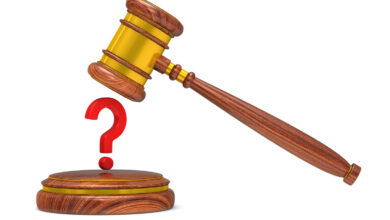Trump Forgot to Corrupt the Inspectors General

Donald Trump’s failure to corrupt the executive branch all the way down to the level of the inspectors general may lead to his downfall.
The irony is both comical and awful: It could be Trump’s failure to finish the job of corrupting his administration totally, not the widespread corruption itself, that winds up costing him his presidency.
Over the last two weeks, two federal inspectors general—the Intelligence Community Inspector General (ICIG) and the State Department Inspector General (DOS-OIG)—have stepped forward to expose presidential misconduct that has put Trump on a fast track to impeachment.
First, ICIG Michael Atkinson found that a whistleblower’s allegations of corruption in President Trump’s dealings with the president of Ukraine were both credible and a matter of urgent concern. The ICIG’s finding led to public disclosure of the whistleblower’s report, despite the determined efforts of the White House and the Department of Justice to bury it.
A few days later, State Department Inspector General Steve Linick requested an “urgent” briefing with a number of Senate and House committees “to discuss and provide staff with copies of documents related to the State Department and Ukraine.”
The materials Linick provided to the congressional committees were “a packet of propaganda and disinformation spreading conspiracy theories” about Ukraine and the Biden family, according to Rep. Jamie Raskin, who attended the briefing. The documents, which included notes of interviews Rudy Giuliani conducted with a former Ukraine official, were contained in Trump Hotel folders.
And guess who was responsible for delivering this pile of propaganda to the State Department?
Rudy Giuliani.
Giuliani admitted on Wednesday that he handed these materials “directly to the Secretary of State,” Mike Pompeo, in March.
This bit of ugliness might look like just another Giuliani clown show, but it demonstrates the lengths to which Giuliani and Trump have gone to instigate phony government investigations into debunked conspiracy theories about a likely 2020 election rival, Joe Biden.
And it also shows the lengths to which innocent government officials, like the IG, are now lining up to establish their independence and distance themselves from any hint of corruption.
Acts of independence like these are extremely rare—almost non-existent—within the Trump administration. Yet two of them popped up at almost the same time, both by inspectors general.
So who are these people, and why are they stepping up to the plate to tell the truth in an administration that doesn’t welcome it?
Congress enacted the Inspector General Act of 1978 to establish an independent, non-partisan organization within executive branch agencies to investigate cases of misconduct, waste, fraud, and other abuse within the agency. There are currently 73 offices of inspectors general within the government including, of course, the Intelligence Community and the Department of State.
Congress attempted to build integrity into the DNA of the inspector general position. Although IG’s are under the “general supervision” of their agency heads, agency heads cannot prohibit IG’s from initiating, carrying out, or completing any investigation—or from issuing subpoenas. Inspectors general are empowered to report directly to the attorney general whenever they have reasonable grounds to believe there has been a violation of federal law. When an IG identifies egregious problems or abuses within the agency, the agency head is required to forward the IG’s report to Congress.
All of which helps establish a culture of independence and objectivity in the role of IG.
But despite statutory safeguards, integrity is far from assured. Cabinet-level IG’s, including those within the intelligence community and the State Department, are appointed by the president. Although the statute contains aspirational language about making appointments “without regard to political affiliation, and solely on the basis of integrity and demonstrated ability,” we all know how that works.
In other words, nothing prevents a corrupt president with a compliant Senate majority from populating the IG offices with toadies, favor-seekers, and political partisans.
***
So where did Trump go wrong? How could he have failed to put reliable loyalists into these key positions?
The most likely answer is that he simply wasn’t paying attention. Trump seems to have been blissfully ignorant of the potential for inspectors general to hold him and his administration accountable. It is not difficult to imagine that Donald “My Primary Consultant Is Myself” Trump might have dismissed inspectors general as just another bunch of faceless bureaucrats whose advice he didn’t need.
State Department IG Steve Linick, for instance, was just the kind of low-profile government official who might never come to Trump’s attention. He was already in place when Trump entered the White House. His resumé included stints in California and Virginia as an assistant United States attorney, service in the DOJ’s National Procurement Fraud Task Force, and three years as the inspector general of the Federal Housing Finance Agency.
This is all perfectly respectable stuff, but almost certainly too boring to capture Trump’s attention.
Except for one very important thing: Linick “was generally viewed to be aggressive” in the probe of Hillary Clinton’s emails. Jackpot! To the extent that Trump was paying attention to that appointment, the perception of Linick as a Hillary foe would almost certainly have been enough in Trump’s mind to convince him that Linick would be reliable.
Atkinson is a different story because Trump himself appointed him in 2018. Again, though, it’s likely that Trump missed this opportunity to put a partisan loyalist in an important position due to nothing more than indifference. He probably viewed Atkinson as just another mid-level career government official who had kept his head down and avoided making waves. Until, that is, he nearly drowned Trump in the whistleblower tsunami.
There are multiple levels of irony here. When it comes to his failure to corrupt the IG community, Trump’s ego, short attention span, and ignorance of the workings of government have turned out to be a blessing, not a curse.
But it could still wind up meaning only that Trump hasn’t quite (yet) finished the job of corrupting the executive branch.
If he wasn’t paying attention to inspectors general during his first years in office, he is now. Look for him to start replacing them, claiming that he’s draining the swamp.
And if Trump remains in office—and especially if he’s re-elected in 2020—he’ll have not only the incentive, but also the time to finish the job.
Unless Congress does something to tighten up the Inspector General Act so that future presidents can’t put political cronies into positions that were designed to be independent, the next would-be authoritarian might not make the same mistake Trump made in failing to pay more attention to the IG’s.




